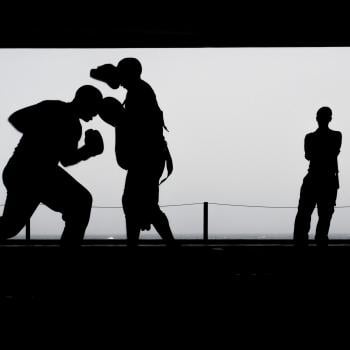According to legend, the 17th century monks of Neudeck ob der Au outside Munich, Germany, developed the rich-and-malty beer to sustain them during Lenten fasts, the traditional 46-day lead-up to Easter.
Unfiltered, the bold elixir was nicknamed “liquid bread” and is packed with carbohydrates, calories and vitamins.
With poor documentation available on the specifics of their fasts, I decided that the only way to know if the story was true would be to test the beer myself. I joined forces with Eric Sorensen, the head brewer at Rock Bottom Restaurant and Brewery in West Des Moines, Iowa, to brew a commercial release of one of my recipes, Illuminator Doppelbock.
I would survive on that beer, supplemented only by water, for 46 days of historical research.
With the blessing of my boss at The Adams County Free Press in Southwest Iowa, I consumed four beers a day during the workweek and five beers on the weekends, when I had fewer obligations. . . .
At the beginning of my fast, I felt hunger for the first two days. My body then switched gears, replaced hunger with focus, and I found myself operating in a tunnel of clarity unlike anything I’d ever experienced.
While hunger subsided quickly, my sense of smell provided persistent temptation for more than a week. But the willpower to carry out my objective brought peace to the “Oh man that cheeseburger smells good” thoughts. Soon, I could see, smell or discuss anything food-related without trouble.
Often, I cooked dinner for my boys, a task that became as simple and trouble-free as tying my shoes.
My fast also underscored for me that there is a difference between wants and needs. I wanted a cheeseburger, but I didn’t need one. I also didn’t need a bag of chips or a midday doughnut. I needed nourishment, and my doppelbock, while lacking the protein that might have provided enough backbone for an even longer fast had I sought one, was enough to keep me strong and alert, despite my caloric deficit.
Though I lost 25.5 pounds, I gained so much more. The benefits of self-discipline can’t be overstated in today’s world of instant gratification. The fast provided a long-overdue tune-up and detox, and I’ve never felt so rejuvenated, physically or mentally.
The experience proved that the origin story of monks fasting on doppelbock was not only possible, but probable. It left me with the realization that the monks must have been keenly aware of their own humanity and imperfections. In order to refocus on God, they engaged this annual practice not only to endure sacrifice, but to stress and rediscover their own shortcomings in an effort to continually refine themselves.
via My Faith: What I learned from my 46-day beer-only fast – CNN Belief Blog – CNN.com Blogs.










